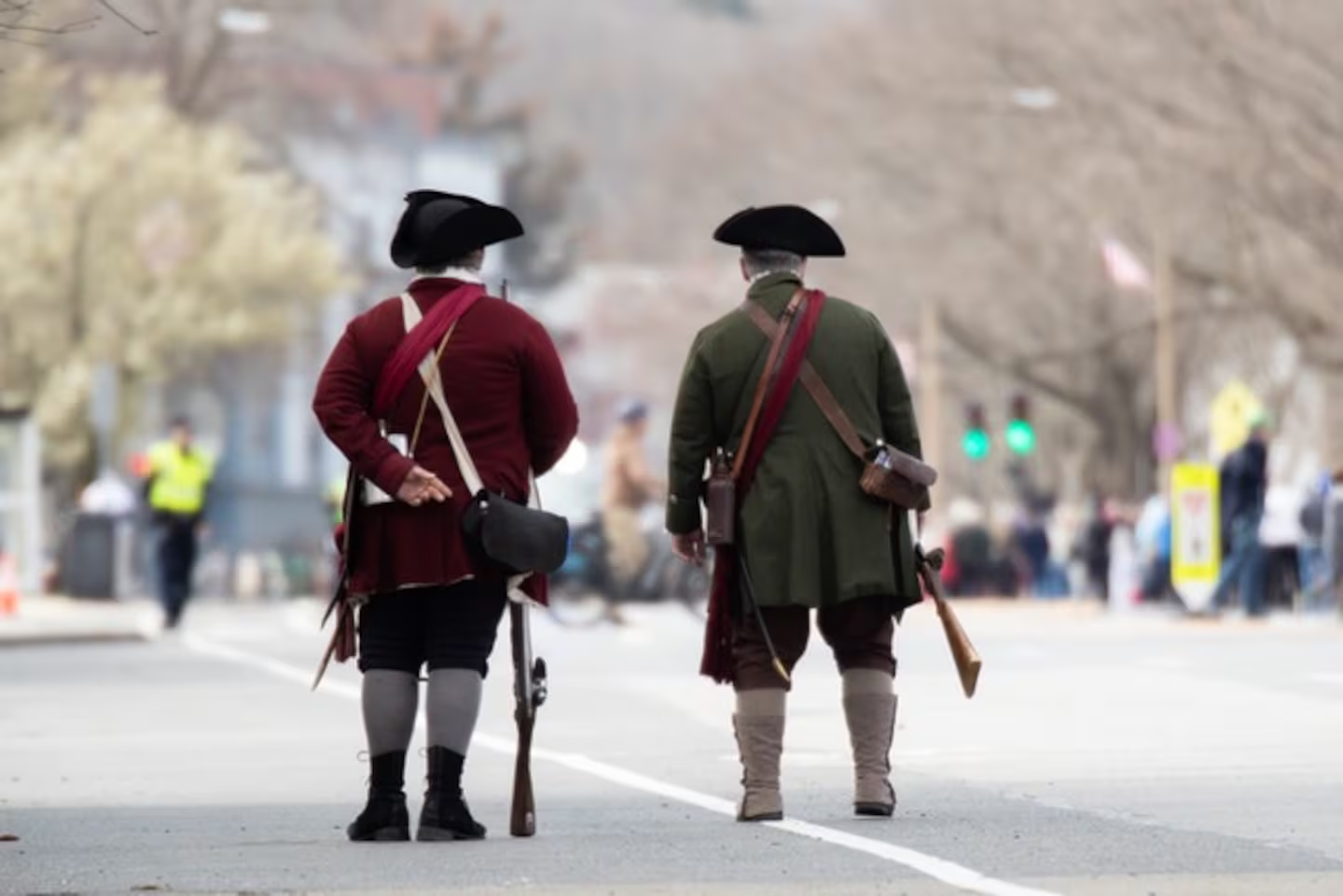‘This history is not about just a bunch of white men who have statues representing them’
Some of the unsuspecting passersby on Massachusetts Avenue in Arlington flinched when the quiet of a sunny Sunday in April was disrupted by a flash of red and a volley of gunfire.
It was a reenactment of a historic battle many of them didn’t know had happened, and a dress rehearsal for a momentous commemoration most weren’t aware had already gotten underway.
The bloody skirmish between colonial militia and retreating red-coated British troops in what was then called Menotomy was long overshadowed by the confrontations a few hours earlier at Lexington and Concord that triggered the American Revolution on April 19, 1775.
Now momentum is building toward next year’s 250th anniversary of that day, and related events. These are likely to bring a rush of visitors to Massachusetts, including during periods already crushingly busy — and will have a much wider scope than in the past, extending to places and people whose roles in the drama of those times have not been previously widely known.
“It’s a global spotlight, and we have an opportunity to embrace that,” said Nancy Gardella, executive director of the North of Boston Convention and Visitors Bureau, which includes several towns and cities that will host events.
The years-long commemoration has already started, with the 250th anniversary of the Boston Massacre on March 5, 2020 — though that was eclipsed by the COVID-19 shutdowns, which descended just a few days later — and the 250th anniversary of the Boston Tea Party in December. It will peak on Patriot’s Day weekend next year with the 250th anniversary of Lexington and Concord, followed by the 250th anniversary of the Battle of Bunker Hill next June 17 and ending March 17, 2026, with the 250th anniversary of the end of the 11-month British siege of Boston.
Those will be followed by broader ceremonies to mark the 250th anniversary of the Declaration of Independence, including a visit to Boston by the tall ships from July 7 to 16, 2026.
Organizers plan to widen the lens on these events by including more information about the contributions of women and Black and Indigenous people.
“There’s a big push to make sure that all Americans can see themselves,” said Noelle Trent, president and CEO of the Museum of African American History.
“This history is not about just a bunch of white men who have statues representing them,” said Beth Williams, tourism manager for Concord.
Added Nina Zannieri, executive director of the Paul Revere Memorial Association, which runs the Paul Revere House: “There’s an effort this time to make sure we tell the stories of the people who have been traditionally left out.”
And the places. There are events planned in communities from Arlington to Chelsea, where battles occurred that haven’t gotten the same attention as the ones in Lexington, Concord, and Charlestown.
“It’s an opportunity for other towns to be brought into the narrative,” said Katie Luczai, economic development coordinator in Arlington.
The Battle of Menotomy was the longest of April 19, with 12 Americans killed as they harassed the retreating British. Most of the fighting was around the Jason Russell House, now a museum, in which there are still holes left by musket balls.
Luczai said she suspects that one of the reasons this part of the conflict is less well known is that it wasn’t in Henry Wadsworth Longfellow’s famous poem about Revere’s ride.
The 250th anniversary, she said, “is definitely a huge opportunity that we’re trying to take as much advantage of as possible” to change that.
Another lesser-known clash occurred in Chelsea: the Battle of Chelsea Creek, in which colonial soldiers captured and burned a British ship. That has given the city a chance to connect its immigrant population with an origin story they might not have known, said Malik Howshan, officer of innovation, access, and opportunity for the Chelsea Public Schools.
“Getting people to understand the history of where they live helps them build connections, so they feel a bit more American,” said Howshan, who previously taught history in Methuen. “It sets up future citizens who are invested.”
After this anniversary, he said, “people will come to Chelsea and have a better appreciation for what it is, and about the role that Chelsea played.”
History puts Massachusetts at the center of the Revolution, up until the British retreat from Boston Harbor, when events continued elsewhere. “The American Revolution happened here and then they went to Philadelphia to fill out the paperwork,” said Kate Fox, executive director of the Massachusetts Office of Travel and Tourism, quoting historian Robert Allison.
Fox and other tourism officials said it’s too early to know the economic impact of the 250th, though Gardella said it’s certain to boost the typical $24 billion in annual state tourism spending by at least 50 percent.
Whatever the financial outcome, events are likely to be very crowded.
More than 160,000 people squeezed into Lexington and Concord for the bicentennial reenactment of the battles there, when then-President Gerald Ford came to lay a wreath at the base of the statue to the minutemen. Then as now, the Boston Marathon coincided with the anniversary, but the Marathon has grown significantly since, selling out hotels and restaurants in a wide radius.
Instead of Marathon Monday, when Patriots Day is typically observed, planners have already scheduled next year’s Lexington and Concord reenactments for two days earlier, on Saturday, April 19, spreading out the crowds. And even though the battle in Menotomy happened on the same day, that reenactment will be Sunday — which, next year, is also Easter.
The tall ships visit and Declaration of Independence anniversary coincide with the World Cup, seven matches of which will be played in Gillette Stadium from June 13 to July 9, 2026. “The manna-from-heaven tourism trifecta,” Gardella called it — though one likely to cause bottlenecks.
“Especially if you’re going to want hotel accommodations or restaurant reservations, I wouldn’t wait to book anything,” Fox said.
The National Park Service plans to add staff and offer apps and QR codes for an expected flood of visitors to guide themselves on tours, said Liza Stearns, director of visitor engagement. The park service is spending $25 million to restore the Dorchester Heights Monument, which memorializes the evacuation by the British from the harbor, and making $1.4 million in repairs to the Bunker Hill Monument.
Other attractions, including the Paul Revere House, are staffing up and extending their hours.
At a time of division, planners said that celebrating the nation’s founding could bring Americans together.
“I would hope that folks see there are more things we have in common than keep us apart,” said Gary Clayton, cochair of the Concord250 Executive Committee.
“The hope is that people will hear the whole story and feel that this matters and that it still matters and it tells us as who we are as a country,” Zannieri said — “imperfect but still remarkable.”
A state website of 250th anniversary events is at 250.ma.
View article: https://www.bostonglobe.com/2024/06/06/lifestyle/lesser-known-american-revolution-battles-fight-for-attention/?event=event12






